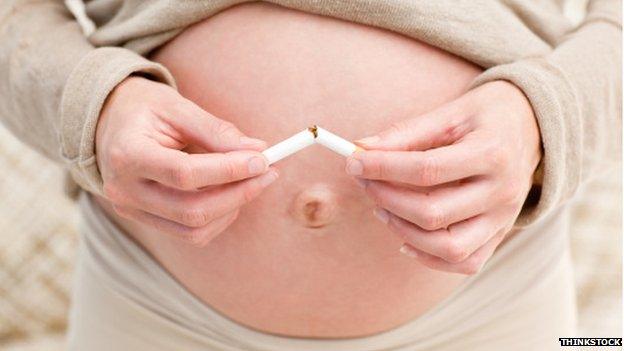Over-35 pregnant smokers risk baby heart defects
- Published

Women who smoke while pregnant could be damaging their babies' hearts
Babies born to women over 35 who smoke are at greater risk of having specific heart defects, suggests American research.
The study, from Seattle Children's Hospital, adds to existing evidence that smoking during pregnancy can damage babies' hearts, as well as increase the risk of miscarriage, small babies and premature birth.
Around 13% of women smoke during pregnancy in England.
The government has set a target of 11%.
Smoking during early pregnancy could account for 1%-2% of all heart defects in babies, the study said.
The study is being presented at a meeting of the Pediatric Academic Societies in Vancouver, Canada, by scientists from Seattle Children's Hospital and the University of Washington School of Public Health.
Heaviest smokers
The research team analysed the hospital records of 14,128 children born with heart defects between 1989 and 2011 and compared them to the records of more than 62,000 children born without heart defects in the same year.
They looked at the proportion of children with heart defects whose mothers said they smoked during pregnancy and the proportion of children without heart defects whose mothers smoked.
Their results showed that babies of smoking mothers were more likely to have a congenital heart defect if their mothers smoked during pregnancy - and the risk was highest in the heaviest smokers (smoking more than 20 cigarettes a day).
Older women, aged over 35, were twice as likely to have a baby with a heart defect, if they smoked, compared to non-smoking pregnant women.
The heart defects picked up in the study included problems with the valve and vessels that carry blood from the heart to the lungs and holes in the wall separating the two chambers of the heart. Invasive surgery is required to correct these defects, the study said.
'Serious problem'
Dr Patrick Sullivan, lead study author and clinical fellow in paediatric cardiology at Seattle Children's Hospital, said: "Ongoing cigarette use during pregnancy is a serious problem that increases the risk of many adverse outcomes in newborns.
"Our research provides strong support for the hypothesis that smoking while pregnant increases the risk of specific heart defects."
Dr Sullivan said it was not completely clear how smoking damages babies' hearts during pregnancy but it is thought to be related to restricted oxygen flow to the heart.
The government set a target to reduce the percentage of women who smoke during pregnancy from 14% to 11% by 2015. It is currently thought to be around 13%, which equates to 83,000 babies born to smoking mothers each year in England.
Previous research , published in 2010, found one study that reported a 15% increase in the risk of a baby having a heart defect and a separate case control study of more than 3,000 infants, which reported a doubling of the risk for atrial septal defects, a kind of heart defect.
Amanda Sandford, research manager at Action on Smoking and Health (ASH) said: "This study provides further evidence of the potentially long-term damaging effects of smoking during pregnancy.
"All pregnant women who smoke should be offered advice and support to quit to avoid life-threatening conditions to both themselves and their babies."
- Published28 March 2014
- Published24 January 2014
- Published28 March 2014
- Published2 June 2013
- Published13 May 2013